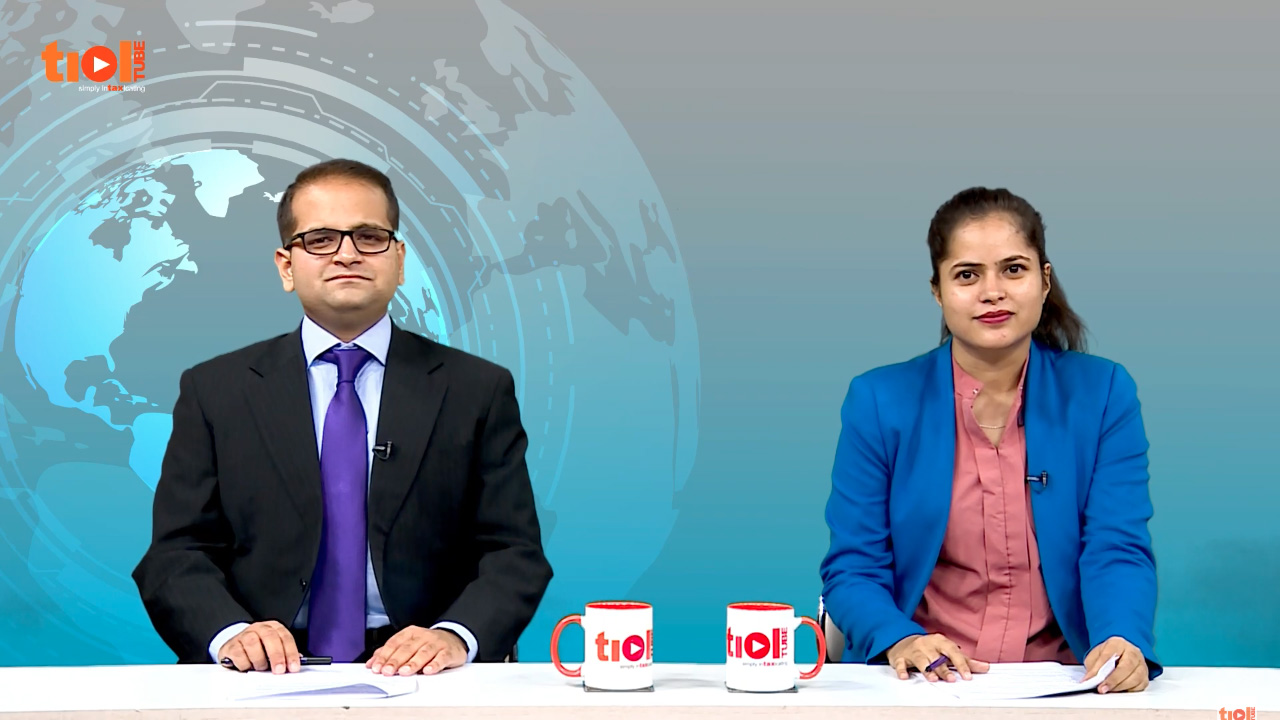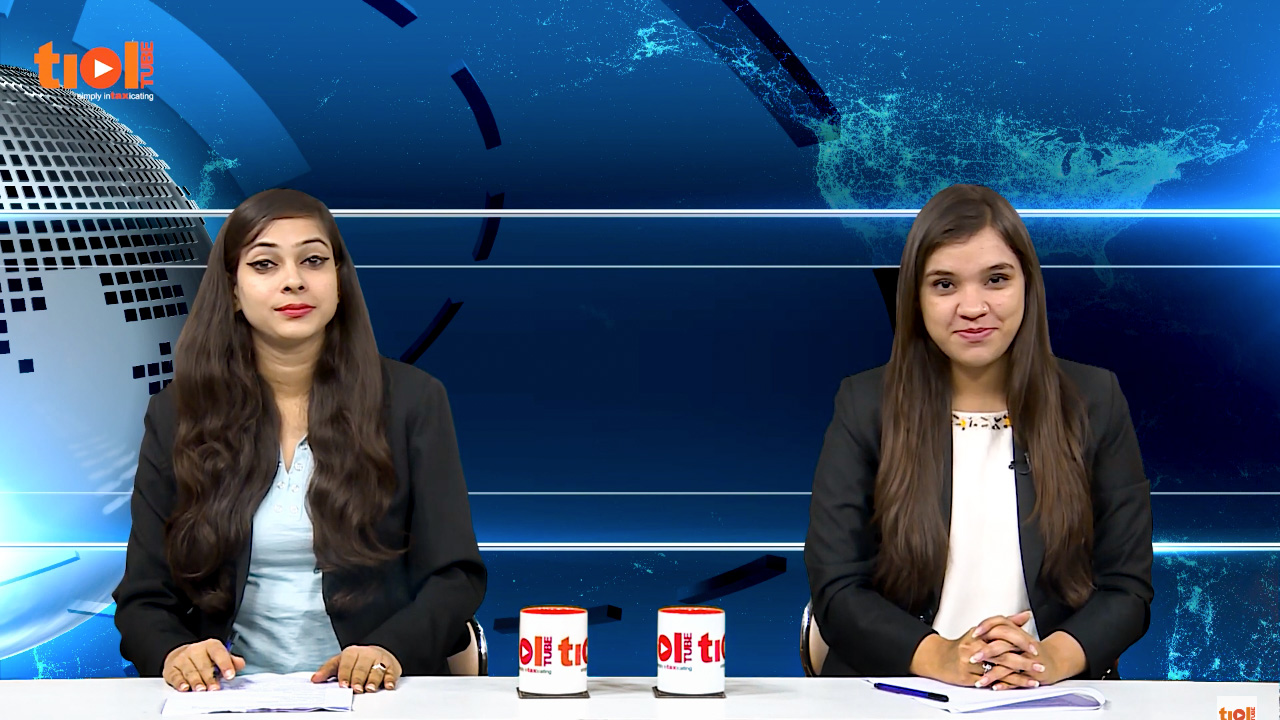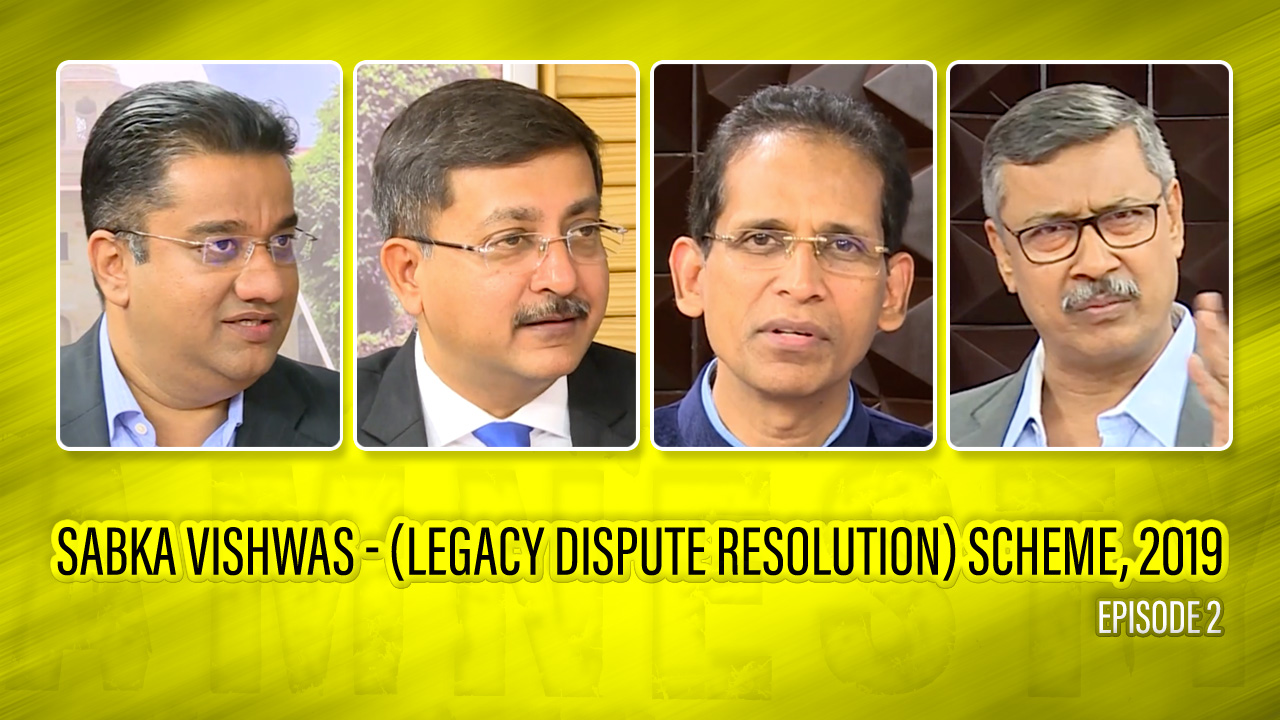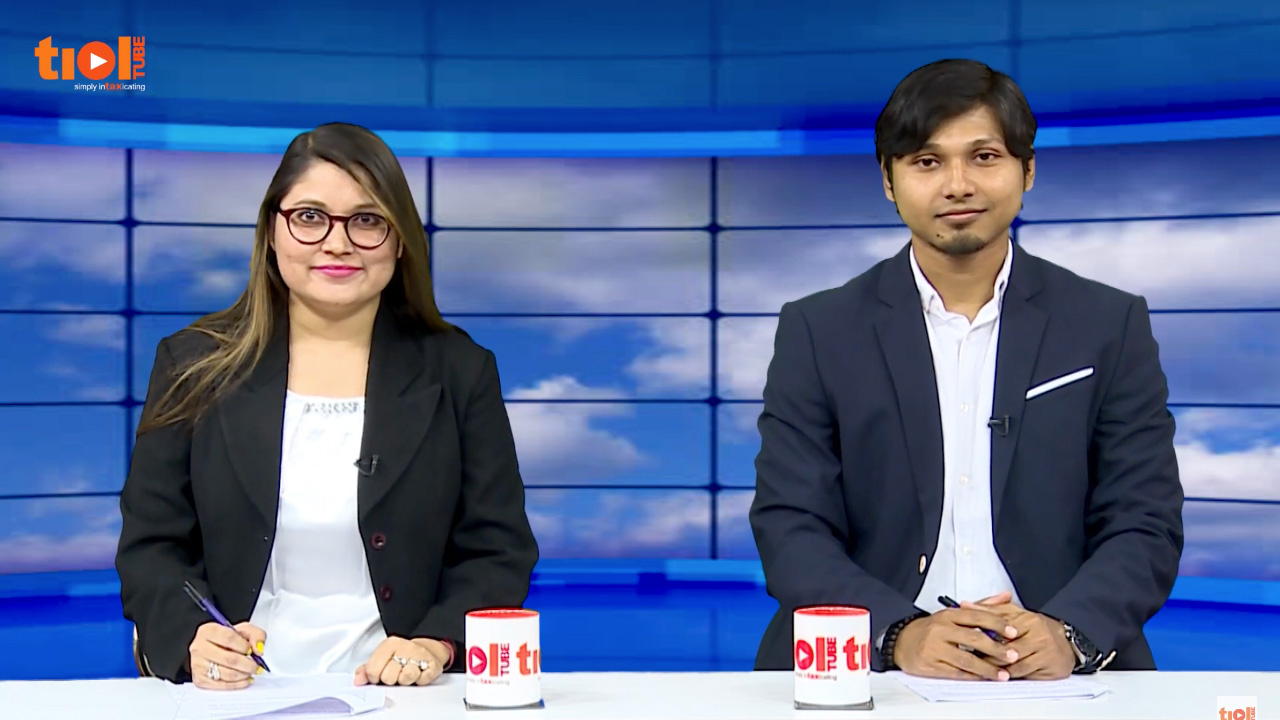| SERVICE TAX
2019-TIOL-3266-CESTAT-AHM
Rahil Air Bubbles Pvt Ltd Vs CCE & ST
ST - Appellants imported bubble wrap manufacturing machine and paid the customs duty on the entire bill value of the machine -the case of the department is that the supplier has undertaken erection and installation of the machine, therefore, since the service of erection and installation are provided by the foreign party to the appellant, the appellant is liable to pay ST on reverse charge mechanism in terms of section 66A of Finance Act, 1994 [Act] -for this purpose, the sale value of the machine is artificially bifurcated by applying the notification 19/2003-ST dated 21.3.2003 whereby the 33% was taken as service and ST was demanded on such portion– appeal to CESTAT.
Held: The entire transaction is of purchase of imported bubble wrap machines - the appellants have discharged customs duty considering the total value of machine shown in the invoice - there is no separate charge for services such as erection and installation of such machinery - on the total value of the invoice, customs duty was paid - the erection and installation is incidental to the sale/supply of the machine - therefore, the entire transaction is of sale and purchase of the machine and, hence, no service is involved - therefore, no ST can be demanded - this issue is squarely covered by the Tribunal judgment in the case of Bhavik Terryab - 2017-TIOL-1429-CESTAT-DEL –following the ratio of the said decision, the impugned order is set aside and the appeal allowed : CESTAT [para4]
- Appeal allowed: AHMEDABAD CESTAT
2019-TIOL-3265-CESTAT-DEL
Tulip Global Pvt Ltd Vs CCE
ST - Appellant is engaged in the business of selling business kits containing suit lengths under multi-level marketing business plan - Under this plan, the persons desirous of purchasing the business kit become distributor of the appellant after filling and submitting the distributor application form - The appellant issues a receipt to the distributors towards purchase of business kits who can, if satisfied, introduce two persons who purchase business kits and in turn also become a distributor - The business kits primarily contains only the suit length and distributor forms - If a person after becoming a distributor sells the suit length to persons, he will also get some commission from the appellant - From 2006 onwards, the appellant also provided one insurance cover to the distributor free of cost for promoting the distribution of its products in the form of business kits -officers entertained a view that the appellant had been rendering support service for business and commerce to its distributors - show cause notice dated 4 April 2012 came to be issued where under service tax amount of Rs.96,12,94,577/- was demanded – demand confirmed by Commissioner along with imposition of penalty and interest, hence appeal before CESTAT.
Held: From a perusal of the clarifications issued by the Department of Revenue vide Circular Nos. 334/4/2006-TRU dated 28.2.2006 and 334/3/2011-TRU dated 28.2.2011, it can easily be inferred that the Business Support Service includes the activities which support the main business activity like service of providing infrastructure for running an office or a business and like activities -in the present case, the appellant has adopted a marketing strategy for sale of its product and has not solicited or provided any Business Support Service to the distributors -it is also relevant that the payments which have been received by the appellant is for sale of its product, namely suit length of various brands on which it has paid the applicable Sales Tax/VAT to the State Government - it is a matter of record that the appellant has been purchasing these suit lengths of various brand and same were placed in a carry bag along with a CD containing appellant's business plan, two sets of blank distributor application forms -this combination has been called a business kit -since the appellant has been selling the suit length in the form of a business kit on which applicable VAT was paid, it is a pure sale of goods rather than providing any service to the distributors of the appellant -it is also a matter of record that business kits which are suit lengths were not being traded in the retail sale, but were being sold through a multi-level marketing business model developed by the appellant -thus, the activity undertaken by the appellant is primarily a sale of goods and there is no element of Business Support Services for Business or Commerce -the order-in-original, therefore, deserves to be set aside and is set aside -the appeal is allowed : CESTAT [para 11, 12]
- Appeal allowed: DELHI CESTAT
2019-TIOL-3264-CESTAT-MUM
Swetal Enterprises Vs CGST & CE
ST - Taking of Cenvat credit on various inputs/input services/capital goods during the disputed period was objected to by the department on the ground that the requirement of the statute has not been complied with by the appellant -accordingly, show cause proceedings were initiated against the appellant, seeking for denial of cenvat credit–cenvat credit amounting to Rs.4.83 lakhs was disallowed and appellant was asked to pay interest, equivalent penalty imposed – on appeal, Commissioner (Appeals) upheld the adjudged demands confirmed – appeal before CESTAT.
Held: On perusal of the chart submitted by the appellant, it is found that the appellant has given justification for availment of cenvat credit on inputs, input services and the capital goods -however, on perusal of findings recorded in the impugned order, it is found that the Commissioner (Appeals) has upheld the adjudication order solely on the ground that the disputed input and input services are falling under the exclusion clause provided in the definition -since the submissions made by the appellant in the reply to the SCN and the appeal filed before the Commissioner (Appeals) has not been properly considered, the matter should be remanded to the original authority for fresh fact finding with regard to the submissions made by the appellant -while passing denovo adjudication order, the original authority should examine the statutory provisions and the submissions of the appellant including the case laws on the subject issue and thereafter should record his specific findings regarding entitlement/disentitlement of cenvat credit to the appellant – in the result, appeal is allowed by way of remand to the original authority : CESTAT [para 6, 7]
- Matter remanded: MUMBAI CESTAT
2019-TIOL-3263-CESTAT-AHM
Viral Builders Vs CCE & ST
ST - Appellant had filed a refund application for refund of Rs.19.15 lakhs on 7.8.2007 in respect of the ST reimbursed by him to his sub contractor during the year 2006-07 on the ground of the appellant as well as sub-contractor having paid ST on the same service - SCN dated 14.9.2007 was issued detailing unjust enrichment provisions in section 11B of the CEA as well as on the ground that sub-contractors are liable to pay ST as well as main contractor – in remand proceedings,the Assistant Commissioner issued a SCN invoking unjust enrichment as well as the allegation of appellant not including the value of pre-issue material from the principal – vide impugned order, the Commissioner (Appeals) held that (a) it is sub-contractor who should have applied for refund (b) there is no disclaimer certificate from the sub contractor (c) there is no evidence of appellant bearing the ST and (d) appellant has not included the value of the material issued by the principal and, thus rejected the refund claim of the appellant once again– appeal to CESTAT.
Held: Commissioner (Appeals) should have decided the matter only on the aspect of unjust enrichment as all other issues were either not raised at the first stage of SCN or settled in favour of the appellant -as regard the unjust enrichment, it is found that though the appellant claimed that they have submitted various records, however, there is no particular record which show that incidence of ST initially borne by the appellant was not passed on any other person -the fact remains that the sub-contractor has charged the ST and the same was reimbursed by the appellant to the sub-contractor -the provision of the ST was clearly made as expenditure in the books of the appellant –once the ST amount is booked as expenditure then the burden to prove that the same was not passed on becomes heavy on the assessee -in this case, no document clearly shows that the incidence was not passed on -moreover, the appellant is a main contractor and for the entire project they are raising the bills including the service charge to the extent of service provided by the sub-contractor to their main client -therefore, it is clear that the incidence of unjust enrichment has been passed on to the service recipient -the service provided by sub-contractor including the ST is the total value which is part and parcel of the value of the service which was charged by the appellant to their client -in this position, though the ST paid by the sub-contactor though initially borne by the appellant and reimbursed the same to the sub-contractor the treatment of the service charge as well as the ST tax is same and the total value of service including ST stand merged with the overall contract value of the appellant which was charged to their client -therefore, in absence of any direct evidence it was not established that the incidence of ST for which the refund was sought for has not been passed on to any other person -accordingly, the refund is clearly hit by unjust enrichment - therefore, on the issue of unjust enrichment, the impugned order is upheld -appeal is dismissed : CESTAT [para 4]
- Appeal dismissed: AHMEDABAD CESTAT
2019-TIOL-3256-CESTAT-CHD
Goyal Trading Company Vs CCE & ST
ST - The assessee is providing various services and filing their ST-3 returns - On the basis of the gross receipt shown to Income Tax department, the figures of ST-3 returns were compared and it was found that the assessee is showing less receipt of services provided by them in ST-3 returns compared to income tax returns - Later on, assessee admitted the short payment of service tax and paid the same alongwith interest - After that, a SCN was issued to assessee within one year of acceptance of short fall by assessee to impose the penalties under Sections 77 and 78 of FA, 1994 - Nowhere the assessee has made any defence regard the short fall of service tax paid by them - If the same is not detected by Revenue, the said short fall remains a short fall of service tax which the assessee would have enjoyed - As the short fall has come during investigation itself and the assessee did not explain the reasons and kept lingering on the matter for two years, in that circumstance, malafides of the assessee have been established by Revenue - Accordingly, penalty is rightly imposed on the assessee: CESTAT
- Appeal dismissed: CHANDIGARH CESTAT
2019-TIOL-3255-CESTAT-ALL
Goldiee Masala Pvt Ltd Vs CCGST & ST
ST - There are two issues in dispute in the present appeal - First dispute is related to confirmation of demand of interest and penalty of service tax to the tune of Rs.13,201/- which has been claimed by revenue as 'works contract service' - The revenue could not establish the said service as 'works contract service' throughout the proceedings - Therefore, the demand as also interest and penalty are set aside - The document produced before the Original Authority established that the said service was 'repair and maintenance service' - The other issue is related to assessee, making adjustment of excess paid service tax of Rs.29,631/- paid in year 2010 and adjusted in the month of August, 2012 - Revenue has objected to the said adjustment and confirmed the demand with interest and penalty, stating that the said adjustment should have not been implemented in subsequent month or quarter as provided in STR, 1994 - Issue is no more res-integra and stands settled by Tribunal's decision in case of M/s Siemens Ltd. wherein it was held that if the adjustment of excess paid amount is denied then there will be twice payment of service tax for the same service - Relying on the earlier decision of Tribunal, demand of Rs.29,631/- along with interest and penalty is not sustainable: CESTAT
- Appeal allowed: ALLAHABAD CESTAT
CENTRAL EXCISE
2019-TIOL-3267-CESTAT-DEL
Prestige Food Vs CCGST & CE
CX- Issue is whether appellant is entitled for interest on the amount refunded w.e.f. the date of respective payments in accordance with section 35 FF of the Central Excise Act, 1944 [Act].
Held: The proviso to the amended section 35 FF of the Act as applicable w.e.f. 6.8.2014 makes it abundantly clear that this will be applicable only for such deposits as are made after coming into existence of this amendment -apparently and admittedly, the amounts in this case were paid in the year 2003 and 2012 – both the payments being prior the aforesaid amendment in section 35FF, this provision is not applicable -otherwise also, it is an admitted fact that order of refund was announced on 8.2.2016, the amount was disbursed on 29.4.2016, once the payment is made within three months of the refund, no question of any interest to be paid along therewith at all arises -the case law as relied upon by the appellant is not applicable to the facts and circumstances of the present case, as in the present case there is no illegal detainment of the impugned amount by the department as is apparent from the arguments put forth by the Departmental Representative that the amount in question was deposited only after Supreme Court had confirmed the deposit of 1/4th amount of duty as was proposed to be recovered vide show cause of the year 1994 -the said order was initially passed in December, 2003 and the residual payment of Rs.14.17 lakhs on 2.3.2012 was also made in furtherance of the directions of the Supreme Court -the amount deposited was, therefore, in furtherance of the direction of the Apex Court, hence cannot be called as illegally detained amount –further, no doubt Supreme Court in August, 2012 directed the department to dispose of the matter on merits and that the order was passed on 8.2.2016 but there is no apparent delay that too intentional or malafide or even negligence on part of the department as is alleged by the appellant -it is observed from the order of Supreme Court dated 6.8.2012 that there are no findings about the entitlement, if any, of the appellant except ordering restoration of the appeal and disposal thereof on merits -keeping in view the same even for the period since August, 2012 till February, 2016, the appellant is held not entitled for the interest as prayed -as a result of these findings, no merit found in the contention of the appellant –appeal, accordingly, stands dismissed : CESTAT [para3]
- Appeal dismissed: DELHI CESTAT
2019-TIOL-3254-CESTAT-DEL
Swastik Panch Biri Works Vs CC, CE & ST
CX - The premises of the assessee was searched during the relevant period - Physical verification of stock revealed there to be excess stock of Bidis as well as some unaccounted stock of Bidis - The Revenue opined that the assessee suppressed production of Bidis, that it failed to make proper entries in RG-12A register and that the bidis were removed clandestinely, resulting in short payment of duty as well as non-payment of duty - SCN was issued proposing to raise duty demand and also imposing penalty u/s 11AC - On adjudication, the demands were confirmed along with equivalent penalty - Seized goods were confiscated with option of redemption on payment of fine - On appeal, the Commr.(A) remanded the matter, whereupon the adjudicating authority re-iterated the demands - On second round of appeal, the demands were sustained by the Commr.(A) - Hence the present appeal.
Held - The Revenue relied on statements wherein the assessee admitted to having purchased loose bidis and the same were partly entered in the bidi stock account - The quantum of bidis entered in the stock account were cleared on payment of duty and the rest were unaccounted for, without payment of duty - Further, in the statement of the bidi thekedar, he stated to have been supplying completely manufactured bidis and was not receiving any raw material from the assessee through job work - Apart from the unaccounted stock of bidis lying in factory premises and in adjoining premises, there is no other evidence suggesting clandestine manufacture and removal - There is no allegation that the stock of bidis found in adjoining premises were branded goods of the assessee - Further there is no corroborative evidence put forth by Revenue in support of clandestine manufacture and clearance of bidis - Moreover, it is also not the Revenue's case that the stock found in the factory premises were in complete manufacture stage or were properly packed with brand name - Only a small number of bidis were found to be properly labelled - Hence the confiscation of such amount of bidis found labelled and packed, is sustained, as is the duty, interest and penalty equivalent to such number of bidis - In respect of the rest, the allegations are not substantiated and are based on assumptions and presumptions: CESTAT
- Assessee's appeal partly allowed: DELHI CESTAT
2019-TIOL-3253-CESTAT-HYD
Concast Ferro Inc Vs CC, CE & ST
CX - The revenue pointed out that the assessee was using cement within their factory without payment of duty and on the basis of challan, issued a SCN alleging interalia that for the reasons given therein the assessee's claim that exemption in terms of Notfn 67/95-CE was incorrect and therefore sought to recover the same along with applicable interest and penalty - It is noted from the said Notfn that the 'capital goods' or 'goods' as the case may be, are granted exemption from duty if the same are manufactured in a factory and used "within the factory of production in or in relation to manufacture of final products" - It is therefore clear that it is not necessary that cement in the case on hand is required to be necessarily used in manufacture, it is also sufficient if cement is used 'in relation' to the manufacture of final product - In the case laws relied on by the revenue, the finding is given mainly considering the fact that inputs are not used in manufacturing process of final product and Tribunal do not see that the issue as to "in relation to" has not been considered or gone into by the Courts - High Court of Madras in case of M/s Thiruarooran Sugars has considered an almost identical issue and even after considering the decision of Apex Court in case of Saraswathi Sugar Mills - 2011-TIOL-73-SC-CX - On an overall consideration, the denial is incorrect and cannot be sustained - Accordingly, the impugned order is set aside: CESTAT
- Appeal allowed: HYDERABAD CESTAT
CUSTOMS
2019-TIOL-491-SC-CUS
Swees Gems And Jewellery Vs CC
Cus - While allowing Revenue appeal against CESTAT order, High Court had held that a textual reading of Section 110(2) of the Customs Act, 1962 would reveal that no separate notice is necessary before extending the limitation period by 6 months; that the authority is only required to record written reasons, based on material and must inform the party of such extension before expiry of the first period of six months - Special leave petition filed by the importer of rough diamonds.
Held: Petitioner seeks leave to withdraw SLP and the same is allowed: Supreme Court.
- Petition dismissed as withdrawn: SUPREME COURT OF INDIA
2019-TIOL-490-SC-CUS
CC Vs BHEL
Cus - Project Imports Regulation, 1986 - CTH 9801 - Sl. No. 26A of Notification 42/96-Cus and 14/2004-Cus - While dismissing Revenue appeal, the CESTAT had held that once the project has been approved as a 'water supply project' by the sponsoring authority, the Revenue cannot go beyond such certificate and deny the benefit of the notification as held by the apex court in the case of Zuari Industries Ltd. - 2007-TIOL-55-SC-CUS - further held that the Tribunal and lower authorities are bound by the law laid down by the Supreme Court because the law declared is the law of the land - Revenue is aggrieved with this order and is in appeal before Supreme Court.
Held: After condoning the delay, appeal is admitted and ordered to be tagged with Civil Appeal no. 1611-1612 of 2019: Supreme Court
- Appeal admitted: SUPREME COURT OF INDIA
2019-TIOL-2553-HC-MAD-CUS
Usha International Ltd Vs Customs and Central Excise Settlement Commission
Cus - The petitioner-company filed application for settlement in terms of Section 127B of the Act and the same was received by the Commission and was numbered - A notice was issued prior to listing of the application u/s 127C(1) for admission, raising queries from the petitioner - One such query was as to whether any case was pending in the CESTAT which would act as bar to the maintainability of the application - The petitioner filed reply reiterating that the application was maintainable and prayed that the same be proceeded with on merits - It was specifically mentioned that there was no matter pending before the CESTAT or any other court, in respect of the SCN issued to it - Thereafter, the petitioner's application was rejected on grounds of being non-maintainable.
Held - The petitioner relied upon a decision of the SETCOM in Shri Agarwal Trading Company wherein the bench proceeded to entertain the application based on the interpretation that the word case used in the proviso would assume the same meaning as its definition in the Customs Act, which means any proceeding under this act or any other act for the levy, assessment and collection of customs duty as contra distinguished from proceedings for prosecution - Moreover, the provisions of Section 127H empower the Commission to grant immunity from prosecution under either the Customs Act, IPC or any other central Act where prosecution was not instituted before date of receipt of application for settlement - The rationale behind such order is very sound - In the present case, had the commission issued notice to the petitioner before hearing the matter, it could have been persuaded to adopt a reasoning similar to that in Shri Agarwal Trading Company - As this was not done, the order of the SETCOM is quashed - The petitioner is directed to appear before the respondent - An order be passed by the SETCOM after hearing the petitioner on the question of maintainability: HC
- Writ petition allowed: MADRAS HIGH COURT | 






